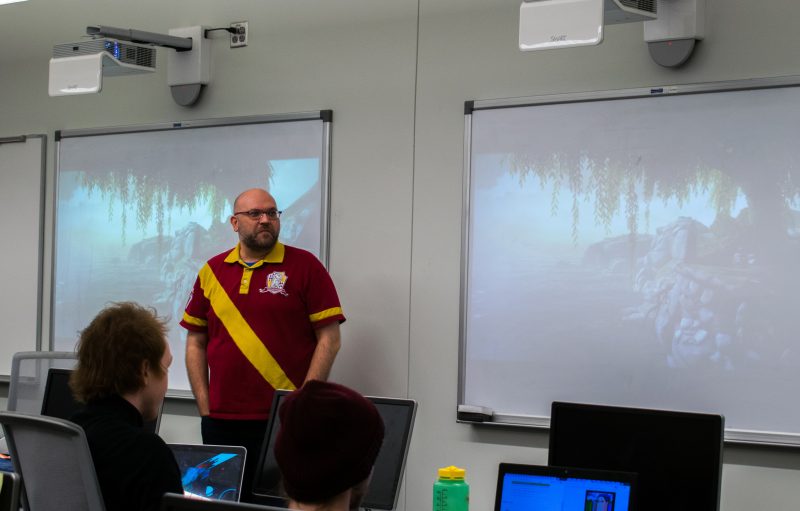Video games have come a long way from the Pac-Man and Tetris days. According to Pew Research Center, about half of American adults played video games on a computer, TV, game console or portable device in 2015.
Though games are, for some, a fun and harmless way to spend a few hours with friends, games can also be a rich, effective medium of visual art and interactive storytelling.
With the rise in the game industry came Trinity’s introduction of courses in game development. Students in upper-division computer science elective courses have the opportunity to design their own video games, build a portfolio and tell stories through games.
Matthew Hibbs, associate professor of computer science, teaches these courses. He explained that learning to make games may give students an advantage when they venture into the job market.
“Having that little bit of game development experience lets [students] build up a portfolio that they can show to potential employers,” Hibbs said. “That’s part of why we do it.”
Hibbs also wants students to recognize that computer science and game development are creative endeavors.
“Video games are an interesting way to express that creativity through software,” Hibbs said.
Students begin their journey into game development by taking the Intro to Game Development course in the fall semester, which exposes them to computer science principles and techniques. Each student individually creates their own video game in this course.
The following spring, students can enroll in Advanced Game Development, where they put their skills to work to collectively create a more complex video game as a group.
Craig Burton, a senior enrolled in Advanced Game Development, is working on a game he pitched himself.
“It’s a game where you play as these pirates on an island, and you’re trying to chop down trees before other people can,” Burton said.
Burton explained that students choose games they would like to create, divide into teams and work on transforming their ideas into video games. His group split into one team that worked on a map of the island in the game, and an engine team that worked on game mechanics.
While Burton did not initially chose to pursue computer science, he is intrigued by the problem-solving aspect.
“I changed my second year into computer science. I would say if you’re interested in it at all, just give it a shot if you like problem solving,” Burton said. “It was probably the best decision I’ve ever made.”
Blair Walker, a junior enrolled in Advanced Game Development, is working alongside Burton on the pirate video game.
“I’m working on the map-making team. To make the game more interesting, we’re randomly spotting a bunch of things on the island so it’s not the exact same experience every time,” said Walker.
Samantha Ortiz, a junior enrolled in Advanced Game Development, is working on a virtual reality (VR) game.
“[It’s] kind of like a space exploration VR game, where you collect different items and it’s networked, so you can play with other people,” Ortiz said.
Ortiz wants to continue to pursue game development in her future.
“I’m a creative writing minor, so I really like storytelling, and I like computer science because logically, it’s just very fun,” said Ortiz. “I think that when I got into game design, it was a nice happy medium for me. It was a combination of creating a story and creating playable content. That’s kind of why I fell in love with computer science.”
Ortiz encourages students who are interested in computer science to push through the introduction courses.
“I feel like a lot of people were turned away in the beginner classes, because they didn’t find their passion in computer science. If you just keep going past that barrier, that’s when you get to choose classes that you want,” Ortiz said. “For me, that’s when I found out that I love computer science. I was able to take game development and found out I can combine two things that I love.”
Hibbs explained that there are two public game nights when Trinity students are given the opportunity to test the video games and provide feedback. The first public game night was on Thursday, March 22.
“People will try to do things that often the programmers haven’t tried to do, so they’ll find bugs and break things in ways that are new for us, and then we try to fix all those things,” Hibbs said.
The next public game night will be around finals week. The date will be announced as the event draws near.







